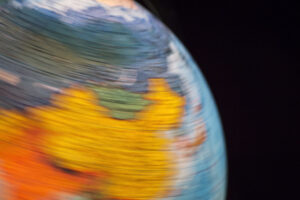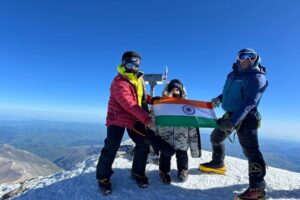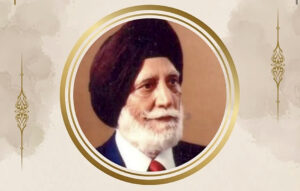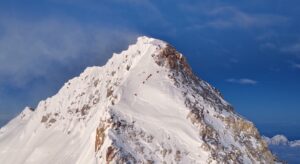The pandemic has roared back into Nepal, both in urban areas and in the mountains. The virus has reached not just Everest Base Camp but also Dhaulagiri and the Khumbu Valley.
The news of COVID in Everest BC has made headlines around the world, but outfitters, climbers, and Nepal’s government have continued an increasingly senseless policy of never mentioning the virus or anything that might throw shade on Nepal or mountain tourism. The few who dared to post critical comments later deleted them.

Empty streets in Thamel (Kathmandu) sadly recall last year’s first lockdown. Photo: Billi Bierling
The public backlash is well underway. Many now demand that the expeditions stop. Also, in Everest’s case, that thousands of bottles of canned oxygen for climbers be donated to local hospitals that lack oxygen for severe COVID cases.
Everest climbers are going up to Camp 3, and the first summit wave could be just around the corner. But when the good news comes, the reaction might not be as enthusiastic as usual.
“However successful the climbing season may be, however worthy the personal achievement for those who reach the summit, the employment to the community, and the friendships made, it will weigh heavily against the lives that will be lost to COVID-19 and the impact on Nepal’s already fragile health system,” blogger and climber Mark Horrell wrote in his latest post.
Dhaulagiri hit
Secrecy was impossible to keep on Dhaulagiri. There, some climbers played the Everest game of denial. Others, such as Carlos Soria, just stated the truth plainly.
“Yesterday, the first positive cases were detected and evacuated by helicopter,” said the 82-year-old Soria. “We are all okay, taking all possible precautions. The priority now is to keep the situation under control.”
They discovered many of the COVID cases because Soria’s partners had brought along testing kits. Soria himself had two doses of an mRNA vaccine before leaving Spain. It is unknown whether either of his two companions also received a vaccine. They are younger and therefore not on the government’s priority vaccination list.

Clouds and COVID cases surround Dhaulagiri. Photo: Carlos Soria
Yesterday, photojournalist/climber Purnima Shrestha happily reported: “We are safe and sound at Dhaulagiri Base Camp, no lockdown, no COVID.”
Only a few hours later, The Himalayan Times reported more than 10 climbers with the coronavirus. “Five climbers including a foreigner were brought to Kathmandu yesterday while nine more — four foreigners and five Sherpas — will be evacuated today after some of them tested positive during the antigen and RDT tests carried out by a medical team from the Nepal Army stationed at base camp,” they wrote.
No evacuations happened from Dhaulagiri today because of bad weather.
Antonios Sykaris admits that he will have a hard time returning to Greece, but continues to play seek-and-hide with COVID. “We here in our small community do not seem to have a problem for the time being,” he wrote obliquely. “About five or six people have left for personal or health reasons, but the rest of us remain healthy and optimistic.”
Sykaris was less discreet about COVID on Everest, where he cited 150 cases already. The lack of official information makes it impossible to know whether that figure is exaggerated or real.
Khumbu Outbreak
Trekkers and climbers are contacting ExplorersWeb or posting in our Comments section. One trekker just back from the Chola Pass and Everest Base Camp wrote: “Of 11 [trekkers], nine of us have contracted COVID-19, probably at Gorak shep (even though all of us had done a PCR test twice before starting the trek). While trekking back to Lukla, we were extremely fatigued with a bad cough, which at that time we attributed to the infamous Khumbu Cough. The Nepal Government should be more strict with PCR testing and also make locals take the test.”
On that score, there is some good news. “The Himalayan Rescue Association clinic at Pheriche was asked by the government a few days ago to do antigen COVID testing and [it] has probably already begun,” Dr. Ken Zafren, Associated Medical Director of the HRA, told ExplorersWeb from Gokyo.
Dr. Zafren also expressed concern about the careless behavior of some climbing groups at lodges. “[Last night] there was a Czech Baruntse expedition that had just crossed the Rinjo La,” he said. “They monopolized the stove in the dining room and never wore masks. When asked about the lack of COVID precautions, they proudly announced that they had quarantined for 10 days in Kathmandu and didn’t need to take further precautions…I hope you will warn your readers that such behavior is not only dangerous but will likely result in further limitations for future expeditions.”
Perhaps because of the spottily enforced quarantines for foreigners in Kathmandu, the virus has already reached the Khumbu Valley. The chances of getting sick and spreading the virus rise every day. Unlike visitors, local families lack travelers’ insurance policies that provide swift evacuation and treatment. So irresponsible behavior is not an option.
Empty streets — and airports
The now-empty streets of Kathmandu recall last year’s lockdown, but the death toll is much higher this time. Everything is closed, except for stores selling essential goods. Those only open from 7 am to 9 am.
International flights have been canceled. Domestic flights ended some days ago, although climbers currently in the Khumbu confirmed that flights linking Kathmandu and Lukla continue three times per week. So trekkers and climbers can return to the capital. Helicopters remain an option (although not a cheap one) to reach Kathmandu. But from there, it is unclear how passengers will manage to leave the country.

Foreigners hurry to catch the last flights out of Nepal yesterday. Photo: Billi Bierling
Large numbers of foreigners lined up yesterday for the last flights leaving Nepal. Among them was Billi Bierling of The Himalayan Database. She had already booked her flight before knowing that all international departures were about to cease.
“It makes me incredibly sad,” Bierling said before leaving. “My heart goes out to this beautiful country that I have grown to love…I hope I will be able to come back soon.”





